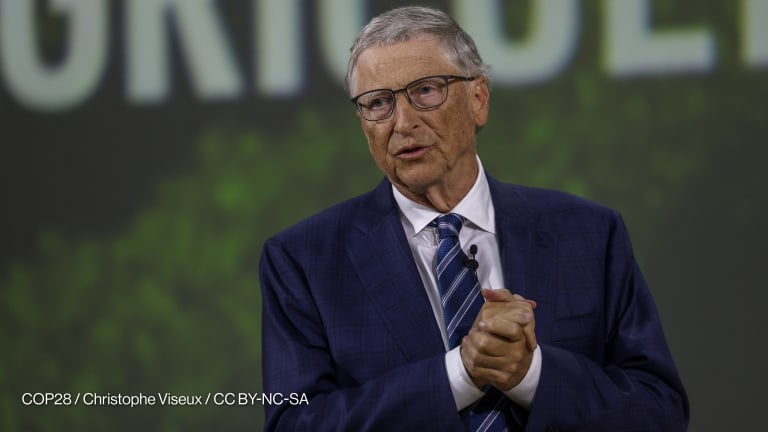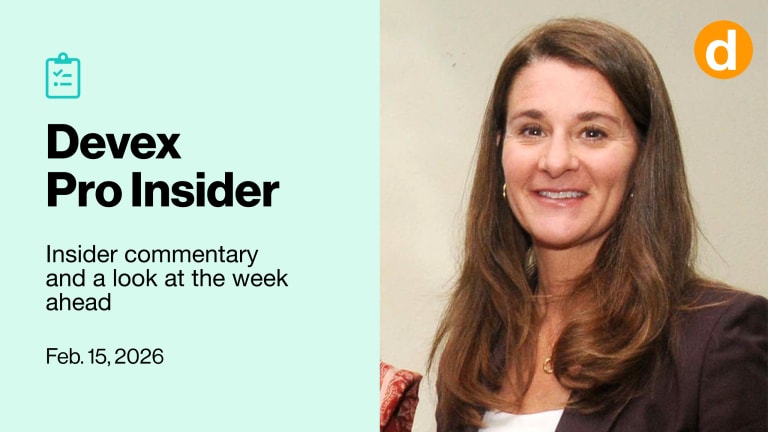Gates pushes for more innovation, funding to fight next pandemic

Billionaire businessman and philanthropist Bill Gates’ vision for preventing the next pandemic involves pushing global agencies like the World Health Organization to be more innovative and fast-moving in their approach.
Wealthier countries also need to step up their funding for pandemic preparedness and consider the benefits of helping lower-income countries strengthen their health systems and expand vaccine manufacturing capabilities, Gates said during the Devex World conference in Washington on Tuesday.
Gates recently published a book titled “How To Prevent the Next Pandemic,” which includes recommendations based on what he learned from experts both within and outside the Bill & Melinda Gates Foundation. In the book, Gates called for the global community to collaborate in innovative ways to bolster health systems and improve access to vaccinations and diagnostics. That could help prevent the gaping inequities experienced during the COVID-19 pandemic, such as unequal access to vaccines, he argued.
“Since pandemic preparedness is a benefit to the rich countries, it shouldn’t be thought of as aid in any way, shape, or form.”
— Bill Gates, speaking at Devex World 2022Gates has criticized agencies such as WHO and the U.S. Centers for Disease Control and Prevention for failing to appropriately “scale up” their response to COVID-19. Yet he thinks it is still possible to work within WHO’s frameworks to create a better global strategy for pandemic preparedness and has suggested forming a dedicated pandemic response team at the agency.
“No, I don’t think we should create something that’s separate from the WHO. … It could be that it’s slightly kept special, but it’s a piece of the WHO,” he said in a prerecorded interview with Devex Editor-in-Chief Raj Kumar.
Investment in both prevention and response at the onset of outbreaks is crucial before they spread internationally, Gates said. But once an outbreak does “escape,” vaccines must be allocated equitably around the globe and not just within wealthier nations, he added.
“The ideal is to just get the capacity up so that within a very short period you can make enough for the entire world,” said Gates from his book-lined office. “We want to have more [vaccine manufacturing] locations — including, over time, some in Africa.”
A handful of new vaccine manufacturing projects have already emerged on the African continent during the COVID-19 pandemic, such as WHO’s messenger RNA technology transfer hub in South Africa and the expansion of the Institut Pasteur de Dakar’s vaccine facility in Senegal.
The key is to ensure enough supply to keep prices low without bankrupting vaccine manufacturers, he said. As part of that effort, the Gates Foundation is investing in “new modular techniques that make the capital cost of having a factory a lot lower.”
Foundation Co-Chair Melinda French Gates — the ex-wife of Bill Gates — and other foundation staffers were recently at the vaccine manufacturing expansion plans in Senegal, he said. The facility is adopting a modular approach, using converted shipping containers for labs that can be swapped in and out as vaccine technologies change.
The Gates Foundation also continues to be a key partner in Gavi, the Vaccine Alliance, as well as COVAX, the international initiative aimed at ensuring equitable access to COVID-19 vaccines.
The foundation is a major contributor to the Global Fund to Fight AIDS, Tuberculosis and Malaria. The Global Fund has asked donors to give $18 billion for its replenishment this year — a $4 billion increase from its 2019 request — to help save 20 million lives and prepare health systems around the world for the next pandemic.
Getting global health funding to “the levels that it needs to be” may prove challenging amid other pressures such as the war in Ukraine, increasing food costs, and ongoing “problems” presented by the pandemic, Gates acknowledged. However, he said he was hopeful that high-income governments would come together to fund pandemic preparedness efforts in lower-income countries because they recognize the broader benefits to their own health security.
“Since pandemic preparedness is a benefit to the rich countries, it shouldn’t be thought of as aid in any way, shape, or form,” Gates said.
Private philanthropy doesn’t have the scale or legitimacy to fill the function of rich governments, he said when asked about the role that the sector could play in global pandemic preparedness. Still, Gates said he hopes other philanthropies will step into the global health space. Within the “effective altruism” movement — whose philanthropist followers aim to maximize the impact of every dollar spent — global health is seen as one the highest-impact areas, he added.
“The global health work we’ve done is very fulfilling. And there are lots of various things like neglected diseases or some of the key innovations that I do hope a lot of other philanthropists come in,” he said.

Search for articles
Most Read
- 1
- 2
- 3
- 4
- 5








